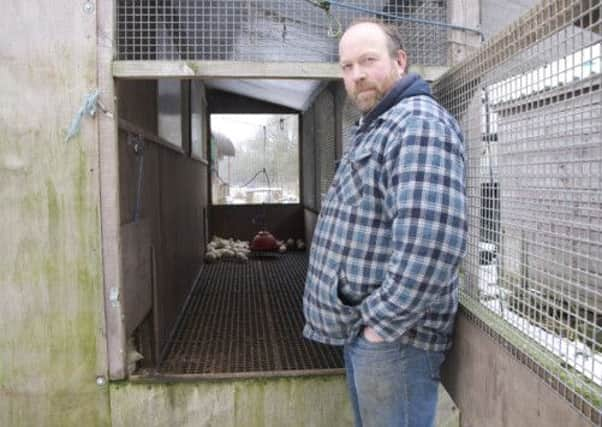Customers will pay for a taste of freedom


Discerning customers will pay up to ten times the price of an economy chicken for their Sunday roast. And top end poultry producers proudly say they cannot satisfy demand.
Paul Talling established Loose Birds, perhaps Yorkshire’s best known premium quality poultry company, from scratch 11 years ago. He now sells about 10,000 chickens and turkeys a year. But he could sell more.
Advertisement
Hide AdAdvertisement
Hide AdThis year he is moving his business from a scattering of locations around the village of Harome, near Helmsley in North Yorkshire, to a single purpose-built site on the parish border of Harome and Norton.
Having resisted the temptation to increase in size, former engineer Paul has chosen to consolidate his self-designed system to make it more efficient. It means that instead of having to travel a mile, the birds will be slaughtered on site. And instead of growing up in two different locations, they will stay in just one.
Paul looked hard at becoming organic too, but he could not make the figures add up. “Organic feed would increase my costs by a third,” he says. “Most people won’t spend more than a tenner on a chicken. You still get the die hards but you really test most people at £10.”
A further improvement, Paul says, could be producing his own chicken feed. At the moment he reseeds the field his chickens roam in every five years or so, using a diverse grass mix. If he can move them to a different field, he will be able to plough and plant a cereal crop instead.
Advertisement
Hide AdAdvertisement
Hide AdPaul’s customers include the Star Inn in Harome, which features Loose Birds chicken in a simple pie with Wensleydale and Hambleton Ale, or in chicken liver and foie gras parfait with gooseberry and green peppercorn chutney and garden sage brioche.
Chef-director at the Star Andrew Pern has even named his second book Loose Birds and Game, after Paul’s business.
Andrew compares the flavour of a Loose Bird to Label Rouge, the top free range birds in France. These birds are bred to be leaner and more active than their British cousins. They are slower to grow and more likely to roam and eat grass.
The breed for producers of any free range meat is crucial, says Paul. “Big commercial companies want free range chickens to grow as fast as possible. I don’t try to compete with them. This product is completely different.”
Advertisement
Hide AdAdvertisement
Hide Ad“When you cook with it the smell is different,” he says. “Basically it’s slightly gamier than your normal chicken.”
The breed he uses is bred to roam and eat grass and, he adds, hard to come by. He slaughters his birds at between 12 and 18 weeks old, while many poultry farmers are looking for a six or seven-week life cycle.
“At this size we’re legally allowed to slaughter 10,000 a year, that’s 200 a week,” Paul says. “I could sell more but because of the red tape I’d need to go from 10,000 to 100,000 to even contemplate doing it.”
This is because he operates an exempt slaughter facility, a licence originally created for farmers wishing to raise Christmas poultry. It allows farmers to kill their own birds without a vet present and requires relatively little investment in infrastructure.
Advertisement
Hide AdAdvertisement
Hide AdIt means Paul can only sell to retailers, not wholesalers, and only in Yorkshire and neighbouring counties. But, as he proudly points out, all his product is sold in Yorkshire.
As well as The Star Inn, Loose Birds are on the menu at Neaverson’s in Huddersfield, Silversmiths in Sheffield and the Craven Arms in Giggleswick. Retail customers include Weetons in Harrogate and the Real Meat Company in Sheffield, as well as butchers local to Harome.
So far Paul has relied on word of mouth. There is no website, it has not been necessary. ‘It’s a niche market and as such we don’t need a lot of customers,’ he says. “We’ve never been able to supply what people want. I could sell more.”